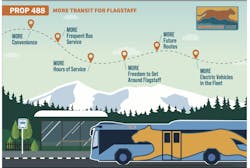General Election 2024 results: Transit ballot measures fare well at the polls
Voters have so far approved 25 out of the 26 transit ballot measures in the 2024 general election, with the results for one measure still outstanding. This success builds upon the 27 public transit ballot measures passed earlier this year, resulting in an 86.7 percent approval rate.
According to the American Public Transportation Association (APTA), $24.9 billion has been approved so far by voters, bringing the total funding for public transit improvements in 2024 to over $25 billion. APTA notes the results indicate people’s understanding of public transit’s important role in the community.
“Initial results from this year’s public transportation ballot initiatives show a clear trend: Communities across the country are backing public transit. These measures have become a vital indicator of voters’ commitment to investing in transit and this year’s response has been overwhelmingly positive,” said APTA President and CEO Paul P. Skoutelas. “The public’s enthusiasm for investing in transit reflects a clear desire for cleaner, more accessible transportation options in their neighborhoods. The 2024 election has marked a significant step forward for public transportation, as communities continue to invest in a brighter, more sustainable future for everyone.”
“This year, Americans showed they fully support funding for public transit, approving almost 87 percent of initiatives across the country. Now, our communities will have the support they need to invest in their neighborhoods, leaving infrastructure that will be here for our kids and grandkids,” said Jessica Grennan, executive director, APTA Center for Transportation Excellence. “The success of these measures shows that voters are committed to improving mobility, increasing access to essential services, and ensuring all residents have the infrastructure needed to thrive, and get where they need to go.”
Breakdown of approved transit ballot measures
Ballot measures ranged from increases in sales tax and extending current transit taxes to establishing new business taxes on rideshare companies and expanding levies for property taxes.
Central Midlands Regional Transit Authority (The COMET)
In Richland County, S.C., voters approved the Sales and Use Tax Referendum Question 1 by more than 60 percent, which asked residents to renew a one penny sales tax to fund transportation projects. The renewed tax will collect $4.5 billion over the next 25 years or until that dollar figure is reached, with 22 percent ($990 million) of the revenue funding the The COMET. Specifically, the ballot measure indicates funding will support “projects that may include operational sustainability, establishment of new routes, new construction and improvements to enhance rider safety and comfort, and acquisition of new buses and other modes of transportation.”
The COMET Executive Director and CEO Maurice Pearl released the following statement expressing the agency’s gratitude for the community’s support:
“On behalf of The COMET staff, drivers and the countless individuals who rely on our services for transportation to work, healthcare, education and day-to-day activities, thank you Richland County residents for the trust you have placed in us through your positive referendum vote at the ballot box.
“These funds will not only ensure that The COMET is here to stay but they will also be used to expand our routes and frequency and make the major infrastructure improvements needed for the sustainable future of public transportation in the Midlands.
“We look forward to continuing our services under the current 2012 Penny and encourage riders and residents alike to stay tuned to announcements about enhancements that are on the horizon. Thank you for your continued support.”
Capital Area Transportation Authority (CATA)
Voters in the cities of Lansing and East Lansing, as well as the townships of Meridian, Lansing and Delhi, Mich., approved the CATA’s millage renewal proposition by nearly 70 percent.
“We are extremely grateful for the overwhelming support CATA received at the polls yesterday,” said CATA CEO Bradley T. Funkhouser. “I have enormous pride in our workforce and I share this victory with our workers and with the public. The passage of our millage is a strong vote of confidence in our safe, reliable and affordable transit services. It reaffirms our plan to continue building a seamless public transit network that connects area residents to destinations across the Greater Lansing region.”
The measure asked voters if CATA's operating millage should be renewed for five years starting in 2026; the current levey was passed in 2020 and is authorized through 2025. According to CATA, the millage is a major source of operating revenue, making up about 40 percent of all revenues in Fiscal Year 2024. The current millage generated $24.9 million for CATA operations in 2024.
“Once again, voters across the capital city region have expressed their enthusiasm for CATA and the excellent transit services we provide,” said CATA Board Chair Nathan Triplett. “We’re more committed than ever to continue innovating with new technologies like contactless payment, expanding our new microtransit services and strengthening our community partnerships.”
Other notable wins
Several ballot measures passed in California, with one measure still outstanding in South Lake Tahoe. In Napa, the 30-year Measure U passed with over 70 percent approval, resulting in $300,000 in funding for transit. It also includes funding for low-income public transit subsidies. Palo Alto’s Measure D and San Francisco’s Proposition L passed with 74 percent and 56 percent approval, respectively. While Measure D impacts land use, Proposition L will increase operations funding for Muni through a new business tax on rideshare companies to prevent service cuts.
In Arizona, both ballot measures, Proposition 479 in Maricopa County and Proposition 488 in the city of Flagstaff passed with over 56 percent approval. Proposition 479 will extend the county’s half-cent sales tax to help fund maintaining and operating public transit and light rail for the next 20 years, starting Jan. 1, 2026. Proposition 488 Voters will extend and increase the current transit tax by about $0.20 per $100. Funding may be allocated to fleet electrification, service hours expansion, improved frequency and expanding the service area.
Virgina, Washington state, Tennessee, Ohio, North Dakota and Colorado also all had transit ballot measures pass. More information on transit ballot measures can be found on APTA’s website.
About the Author
Megan Perrero
Editor in Chief
Megan Perrero is a national award-winning B2B journalist and lover of all things transit. Currently, she is the Editor in Chief of Mass Transit magazine, where she develops and leads a multi-channel editorial strategy while reporting on the North American public transit industry.
Prior to her position with Mass Transit, Perrero was the senior communications and external relations specialist for the Shared-Use Mobility Center, where she was responsible for helping develop internal/external communications, plan the National Shared Mobility Summit and manage brand strategy and marketing campaigns.
Perrero serves as the board vice president for LIT and is a member of the American Public Transportation Association Marketing and Communications Committee. She holds a bachelor’s degree in multimedia journalism with a concentration in magazine writing and a minor in public relations from Columbia College Chicago.

